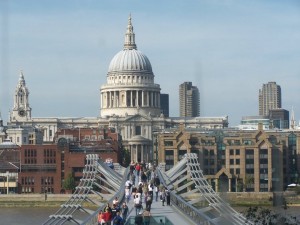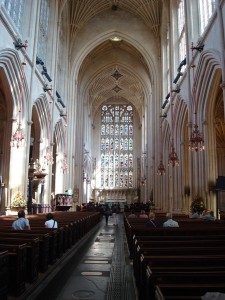After visiting several religious sites, including St. Paul’s Cathedral, Westminster Abbey, the Shri Swaminarayan Mandir, and the East London Mosque, I have noticed two prevailing influences on places of religious worship in London: government involvement and tourism. Given England’s history of combining church and state, and the level of tourism in London, it is no wonder that one finds these influences, to varying degrees, in places of religious worship around the city. What is debatable is what effect tourism and government have on religious life and the worship within each of these buildings. In my opinion, churches, temples, synagogues, mosques, and the like may receive some benefits from tourism and a close relationship of Church(capital c, intending to refer to institutions) and State. However, on the whole, the influence of the government and the need to attract tourists lead to some troublesome trends in London’s places of religious worship.
By declaring a national religion, a country will very likely run into one of two scenarios. Either a small central government, such as a monarch, will use the national religion as a way to increase power and authority, and will persecute anyone who does not agree with their religious views. One can simply observe the history of the monarchy as they walk through Westminster Abbey, and see that this happened in England with the persecution, and massacre, of Catholics and others. This scenario has a horrible effect on religion, not to mention the human rights issues. If a ruler can influence the Church, then the Church’s message will quickly become distorted. Even if the ruler moves far away from the central texts and traditions of whatever faith is the national religion, there is no room for dissent. Historically, this situation has played itself out repeatedly.
The second scenario that can result from a combining of Church and State is what, in my view, is playing out in present day London. In this scenario, because the Anglican Church is the official religion for a nation that is increasingly secular and religiously diverse, the Church has become, frankly, bland. As a result, no one (or at, least, the intention is no one) is offended by the existence of a national religion. This also distorts the message of the Church, as governmental control has seemingly caused the Church to concentrate more on pleasing the masses than adhering to texts and traditions that could cause controversy. This “blandness” starts a vicious circle, as everyone involved in the Church sees no reason to attend anymore because it is no different than the world around them. This, in my view, is why when you go into St. Paul’s Cathedral or Westminster Abbey you don’t feel like there is an active faith community existent within the building. However, when we visited places like the Mandir or the East London Mosque one felt a sense of vibrancy and activity because these institutions are not as attached to the government. The lay leader at the synagogue suggested that combining Church and State has its advantages and disadvantages. Certainly, government involvement in religion has allowed students to become more educated in different faiths(Although exactly what they are learning and should be learning opens another can of worms) and governmental intervention allows the church to be funded, but is it worth watering down the principals of a major religion?

Picture obtained from http://www.mandir.org/
Almost as prevalent as the influence of government is that of tourism. Even the Mandir had a small museum you had to pay to enter (unless, of course, you had a London’s Visitor’s Pass-a card that also provides discounts at the gifts shops next to the crypt in St. Paul’s). From the perspective of the religious institutions, an influx of tourists allows you to share your belief system, but it’s a fine line between an educational experience and a money-making venture. At what point, and I don’t have an answer, does opening one’s place of religious worship become more about the cool architecture and less about the faith people are observing within the building? I am not saying any of the places we visited crossed such a line, but I know I am not the only one disturbed by the presence of gift shops in churches.
I am interested in seeing if Norwich’s places of religious worship, and in particular Norwich’s churches, differ from that of London’s. I do think we have seen people honestly observing faith here in London and I enjoyed many of the visits we made to these institutions. I simply think that they all, to wildly varying degrees, feel the effects, mostly negative, of tourists and government control.



7 responses so far ↓
Mary Kate // Sep 15th 2010 at 14:18
I agree with everything you have to say here. If there’s one thing about America that my time in the UK has reaffirmed so far, it’s separation of church and state. What a great idea. I think that in America the discussion about church/state separation generally centers around freeing the government from religious influence – no prayers in school, no Ten Commandments in front of the courthouse, that kind of thing. We don’t usually think about how much the church benefits from being separated from the state. Without state influence, the church can stick to its guns and have real passion and real theology.
Thank you, founding fathers. God bless America.
maryc // Sep 15th 2010 at 14:25
Andrew, I totally agree! We’ve had this discussion of religion countless times. You’ve used some good words to describe your perspective of the difference in the role of religion in America and England. Separation of Church and State–a topic I obsess over when studying early America.
You took the words right from my mouth, Mary-Kate, thank you, Founding Fathers.
Freedom of religion or freedom from religion. It’s any American’s choice, but its intricately involved in every aspect of American culture.
amyh // Sep 15th 2010 at 15:26
Andrew, what were your thoughts on the comments of our guide from the synagogue about the benefits of a state religion?
guya // Sep 15th 2010 at 16:00
Amy, I feel that the only two positives of a state religion, although only one of these was brought up by the guide, are educational benefits and constant funding for religion. I found his argument at that point a little unclear(and if anyone can clarify his explanation of the benefits of state religion it would be great).
In addition, the NYC mosque controversy (something the guide touched on as a downside of the way the US handles religion), in my view, is a symptom of too much government involvement in religion. Religious institutions should be able to build their places of worship where they want without the government directing the buildings should go. If people are successful in demanding the NYC government move the mosques, then the US has damaged religion by combining Church(again, capital “c”) and State.
bowmanc // Sep 15th 2010 at 17:10
Too many people have agreed on this blog for me to leave it alone. I think to base our understanding of Anglicanism in London off of the two most famous churches in England, and arguably, the world, is a bit reductionist. These two examples are also much more than religious institutions. For example, St. Paul’s was a national symbol of hope for the the city during the Blitz. I can’t I think we should attend several Anglican services, and then we can judge the vitality of the State religion. To be fair, I think that Anglicanism has turned a bit bland. However, judging off other posts of those who attended religious services, it seems that European religion (at least, Christianity and its different branches) simply may be more liberal than our American counterpart. Great post!
Karl // Sep 20th 2010 at 12:22
I’m wondering in what ways you have seen the monarch or government intervening in the Church’s affairs to make it “bland.” We wink and nod at the Queen, but it is the archbishop who makes the real decisions. And if you are looking for controversy, see the archbishop of Canterbury’s comments on sharia law a few years ago. The fact that most of Europe has greatly secularized suggests to me that this isn’t about the UK or church/state. Perhaps it is a function of countries that have taken up the Enlightenment and seek truth/authority not in kings, queens, or priests but in science, law, and society. Why the US is different, given that our revolution was a product of the Enlightenment, is harder to explain.
guya // Sep 20th 2010 at 14:20
While I agree that the Enlightenment led to much more divergent views concerning religion, I think the strong presence of religion in the US and the strength of faiths besides Anglicanism in the UK (despite the presence of the Enlightenment in both situations) suggest that there is at least some correlation between the strength of a religion and its relation to the state. However, I cannot come up with any specific examples to point to why this is the case in England. This may simply be a case of correlation not necessarily equaling causation, and I should do more research before connecting the two.
You must log in to post a comment.